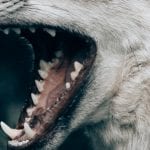Resources » Biology
Resources ≀ Biology

Grasshopper Consumption by Grey Wolves and Implications for Ecosystems
December 3, 2019
The eradication and subsequent reintroduction of grey wolves (Canis lupus) in the western United States has provided unique insights into the role these predators play in regulating ecosystem functioning and dynamics. Although the importance of wolves in ecosystems has been … read more
Posted in Biology | Tagged consumption, ecosystems, grasshopper, implications, wolves

Tooth Fracture Frequency in Gray Wolves Reflects Prey Availability
October 31, 2019
Exceptionally high rates of tooth fracture in large Pleistocene carnivorans imply intensified interspecific competition, given that tooth fracture rises with increased bone consumption, a behavior that likely occurs when prey are difficult to acquire. To assess the link between prey … read more
Posted in Biology | Tagged availability, fracture, frequency, reflects, tooth, wolves

Wolves, But Not Dogs, are Prosocial in a Touch Screen Task
June 15, 2019
Prosociality is important for initiating cooperation. Interestingly, while wolves rely heavily on cooperation, dogs’ do so substantially less thus leading to the prediction that wolves are more prosocial than dogs. However, domestication hypotheses suggest dogs have been selected for higher … read more

Wolves Lead and Dogs Follow, But They Both Cooperate With Humans
June 15, 2019
Due to their convergent evolution, dogs have been suggested as a good model for the evolution of human social skills, such as tolerance and cooperativeness. However, recent studies have revealed that wolves (dogs’ closest undomesticated relatives) are more tolerant and … read more
Posted in Biology | Tagged cooperate, follow, humans, wolves

Carrion – It’s What’s for Dinner: Wolves Reduce the Impact of Climate Change
June 15, 2019
Humans have viewed wolves as competitors, threats to personal safety, and symbols of evil throughout history. By the early part of the 20th century, gray wolves (Canis lupus) had been eradicated from 42% of their historic range in North America … read more
Posted in Biology | Tagged carrion, climate, dinner, impact, reduce, wolves

Carnivoran Hunting Style and Phylogeny Reflected in Bony Labyrinth Morphometry
June 15, 2019
Information is sparse about aspects of female wolf (Canis lupus) breeding in the wild, including age of first reproduction, mean age of primiparity, generation time, and proportion of each age that breeds in any given year. We studied these subjects … read more
Posted in Biology | Tagged carnivoran, hunting, labyrinth, phylogeny, reflected, style




